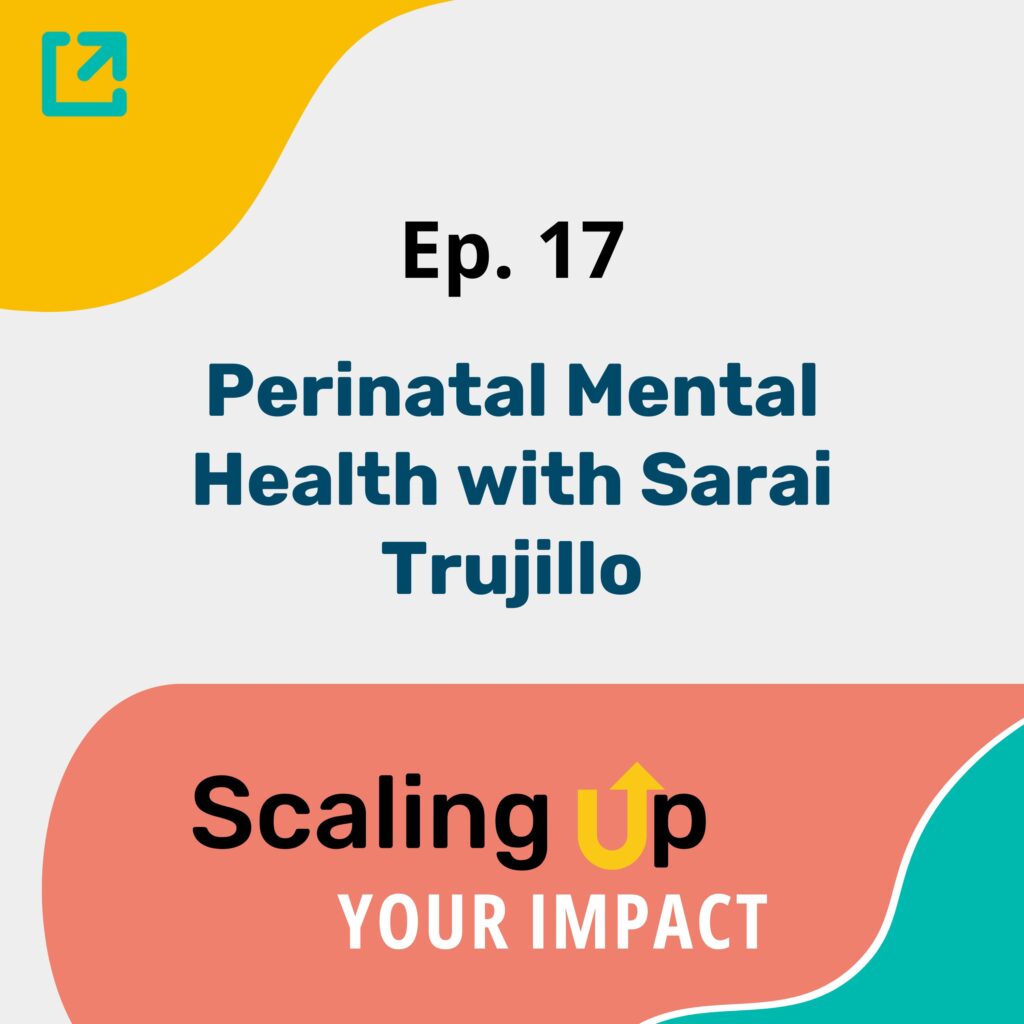Show Notes
Loved what you heard on this episode? Go deeper and connect!
Resources & Links:
- EMDRIA: Go With It Magazine – Perinatal Mental Health Issue
- Open window research shared in the episode
- Connect with Sarai Trujillo for consultation or support: https://coalescencehealth.com/
Transcript
Robyn Mourning: Hi, everybody! Welcome back to the show. I’m Robyn with Scaling Up, and I am really excited today to introduce a special guest on the Scaling Up Your Impact podcast. Here, we offer practical, trauma-informed tools, mindset shifts, and clinical strategies for therapists who want to grow without burning out.
We’re introducing our trainers and consultants who work with us at Scaling Up to share their work and contributions in the field. Today, we have Sarai Trujillo with us—one of our amazing trainers and consultants based in Colorado, who does incredible work across many areas of mental health.
We’ll be talking to Sarai today about perinatal mental health, including using EMDR and other strategies to support people experiencing this life stage. In a future episode, we’ll also discuss infant and early childhood mental health. So, make sure you subscribe or follow so you don’t miss that episode.
Without further ado, hi Sarai! Thank you so much for joining me today. How are you?
Sarai Trujillo: Hi Robyn! I’m doing well. How are you?
Robyn: I’m great! I’m just really excited because I always love chatting with you and learning about how you navigate your career and your work with folks experiencing all kinds of life challenges—and joys. And sometimes, those joys and struggles happen simultaneously, right? Especially for people on the pregnancy and postpartum journey—trying to conceive, experiencing losses, and navigating mental health challenges and past traumas. I’m just really excited to talk to you about that today.
Before we dive in, would you mind taking a couple of minutes to let folks know a little about yourself and your work?
Sarai: Absolutely, thank you. I’m excited to be here. Perinatal mental health has long been a passion of mine. That interest really started back in the late 1990s, actually 1998. Personally, I’m a mother of seven adult children and have ten amazing grandchildren who call me Yaya. My parenting journey began in 1993, and professionally, I became a licensed professional counselor. I now own an insurance-based group private practice, although most of my early career was in community mental health, especially in rural and frontier communities. I’ve worked with all populations and ages, which is typical for rural providers—you have to do a little bit of everything.
I’ve always tried to infuse my work with a broad developmental lens, including the perinatal population, which has been a core focus for me.
Robyn: I can imagine there’s a lot of demand in rural communities, given the limited number of providers. You really had to “do it all,” which is both challenging and rewarding. How did you begin to specialize in perinatal mental health?
Sarai: That path actually started before I became a counselor. It began with birthing my own children, experiencing a variety of birth scenarios—home births, hospital births, medicated and non-medicated, ectopic pregnancies—and supporting friends through their own births.
In the late ’90s, I got involved in the home birth community in the Denver metro area. I did a lot of grassroots work: childbirth education, fertility awareness classes, and birth justice organizing. I attended hundreds of births in hospitals and homes, helping people take control and feel empowered in their birthing experience.
Even as I pursued my master’s degree in clinical mental health, I stayed involved in that movement. I sought advanced training through Postpartum Support International, earned their perinatal mental health certificate, and later added EMDR training. Every new tool I learned became integrated into my work with this population.
Robyn: I love how your work merges grassroots empowerment with mental health and trauma-informed care. That dual focus—justice and well-being—is so important, especially for people navigating pregnancy and postpartum transitions. Many therapists or students might not even realize that a career in this space exists.
Sarai: Exactly. Collaboration is key. In my community, I partner with birth workers, home birth midwives, doulas, and hospital staff. If someone is experiencing challenges during pregnancy or postpartum, I’m available to provide direct support, share resources, and even assist with births when needed. During the pandemic, for instance, I attended births in full PPE, showing up wherever I could.
Robyn: That’s amazing. You really embody “boots on the ground” support. The perinatal period is layered and nuanced, and the context you mentioned—crisis, pandemics, or socio-economic instability—really shows how much additional support people need. Your presence fills gaps that medical providers alone can’t always cover.
Sarai: Absolutely. Birth is inherently a courageous act, and during times of crisis, that courage becomes even more visible. Being present during these sensitive periods is a privilege. There’s something profoundly renewing about supporting the birth of a new life, even amid uncertainty and fear.
Robyn: I think that’s such an important point. And I know there’s research supporting this idea, right?
Sarai: Yes. In fact, a study called Two Open Windows by Dr. Sarah Inos Guadamara and Young Kim discusses the perinatal period as a sensitive window of development. During this time, the brain and body are especially receptive to environmental input. This makes it an optimal period for reparative experiences and trauma healing—ideal for therapeutic intervention.
Robyn: That makes so much sense. So the brain is already in a state of openness and readiness. And this applies not only to birthing people but also to close family members involved in caregiving?
Sarai: Exactly. The “window” opens in response to caregiving roles, emotional investment, and active participation in caring for a baby. It’s not just biological; it’s social, relational, and neurobiological. Historically, infants were cared for by multiple adults, which naturally expanded this window of sensitivity. Today, with more isolation, we need to intentionally build support networks.
Robyn: That brings up another critical point: postpartum support. How do you work with people in the postpartum phase, especially when they’re experiencing depression, anxiety, or other challenges?
Sarai: First, it’s important to define perinatal as pregnancy up to one year postpartum. The first weeks are crucial for identifying conditions like postpartum psychosis and offering support. I often help clients create postpartum care plans. We map out who will support them, what roles people will play, and how the environment can be optimized. This may include postpartum doulas, mental health providers, family, friends, community supports, and medical professionals. The goal is to create a network of positive inputs to facilitate healing during this sensitive period.
Robyn: That’s so empowering. Most people don’t know they can plan for postpartum in such a structured way. Your approach helps them proactively access the support they need.
Sarai: Exactly. And while my role as a provider is important, this is ultimately about the broader support network. We want a collective effort—support doesn’t have to be limited to licensed professionals.
Robyn: Absolutely. Let’s talk about EMDR. How do you incorporate EMDR into work with perinatal clients?
Sarai: Enthusiastically! If I get a referral from a hospital or midwife, we integrate EMDR into treatment at any stage of pregnancy or postpartum. This could be trauma processing, anxiety about fertility, flash-forwards to birth experiences, or supporting someone after a traumatic birth. I’ve even used EMDR during births—not for reprocessing, but to help clients access calm, strength, and ally support in real time.
Robyn: That’s incredible! The impact of that support, both for parents and infants, must be profound.
Sarai: It really is. The work is two-generation: supporting adult mental health while also influencing infant development and parent-child relationships. It’s powerful, transformative work.
Robyn: Can you explain a bit more about how this window of opportunity works for people who aren’t the pregnant parent themselves but are part of the family or caregiving environment?
Sarai: Sure. The window opens in response to caregiving and emotional investment. So anyone actively engaged in caring for a baby—siblings, partners, or other close family members—experiences enhanced sensitivity. Historically, multiple adults provided care for each infant, which naturally expanded this window. Today, in more isolated communities, intentional support networks are necessary.
Robyn: That’s fascinating. And it really underscores your advocacy work—helping families access more care, support, and resources. I’m also curious about your approach to postpartum care. How do you support people during the first year?
Sarai: It’s all about planning and preparation. Postpartum care plans include who will provide support, what roles they will play, and how the environment will be structured. This may involve doulas, mental health providers, friends, family, community supports, and medical professionals. The goal is to ensure a smooth transition during this sensitive period with positive inputs for mental health and healing.
Robyn: I love that approach. It really empowers clients to actively shape their support system and gives them tools to navigate this transitional period.
Sarai: Exactly. And it’s more than just my work—it’s about a network and a community. This collective support is essential for families during the perinatal and postpartum period.
Robyn: This has been an amazing conversation. Before we close, what would you like listeners to know about finding you or accessing your expertise?
Sarai: I’m always happy to provide consultation and support. EMDRIA has many excellent resources, including the recent Go With It magazine issue dedicated to EMDR and perinatal mental health. Listeners are welcome to reach out if they want guidance or support in this work.
Robyn: Wonderful. We’ll link to all those resources in the show notes, including ways to connect with you. Thank you again, Sarai, for this incredible conversation. I can’t wait for our next chat about infant and early childhood mental health!
Sarai: Thank you, Robyn. It’s been such a pleasure.



